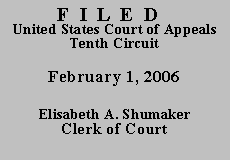

| JAMES SHERRILL,
v.
H. A. RIOS, JR. |
No. 05-1432
(D.C. No. 05-CV-01383-OES) (D. Colo.) |
I. BACKGROUND
Mr. Sherrill is in the custody of the Federal Bureau of Prisons ("BOP"), serving a twelve-year sentence after conviction at a general court martial of absence without leave, indecent acts upon a minor, desertion, and disorderly conduct. See Sherrill v. Commandant, USBD, 118 F. App'x 384, 385 (10th Cir. 2004) (unpublished), cert. denied, 125 S. Ct. 1690 (2005). He claims that in 2003 he was transferred to the medium-security Federal Correctional Institution in Florence, Colorado, even though he has only 7 "custody points" and even though that institution is over 500 miles from his home in St. Paul, Minnesota. Mr. Sherrill asserts that he filed a grievance with the BOP seeking transfer to a low-security facility within 500 miles of his home, but that his request was denied. The BOP also denied his administrative appeal, stating that he could not be transferred "because Low security facilities are experiencing population pressures and unable [sic] to accommodate additional inmates at this time." Mr. Sherrill alleges that he exhausted administrative remedies in May 2005.
In July 2005, Mr. Sherrill filed the current § 2241 petition, asserting that he is being held in violation of the laws of the United States because the BOP's denial of his transfer request was arbitrary and capricious, in violation of 5 U.S.C. § 706(2)(A).(1) Specifically, he argues that "[h]undreds of prisoners are regularly transferred to and from low custody facilities even though 100% of BOP facilities are overcrowded, and have been for many years. To say one person may not be transferred do [sic] to overcrowding, while the BOP regularly transfers hundreds of others, is disingenuous . . . [and] implausible."
The district court decided that Mr. Sherrill was alleging a due process violation. It dismissed his petition, concluding that he has no constitutional right to be placed in a low-security facility or in a facility within 500 miles of his home. The court further concluded that although "prison regulations may create a liberty interest if they impose an 'atypical and significant hardship on the inmate in relation to the ordinary incidents of prison life,'" (quoting Sandin v. Conner, 515 U.S. 472, 480 (1995)), Mr. Sherrill's classification and placement did not meet that standard.
On appeal, Mr. Sherrill asserts that the district court erred by failing to address his claim that the rejection of his transfer request was arbitrary and capricious under 5 U.S.C. § 706(2)(A). He asks that we remand for the district court to address that claim.
II. DISCUSSION
The only relief that Mr. Sherrill requests in his § 2241 petition is that he be granted five days' credit for each day served at a medium-security facility and three days' credit for each day served in a facility more than 500 miles from his home. He does not cite any authority in support of this requested relief, nor even indicate why he thinks it would be the appropriate remedy. We deny his section 706 claim because the BOP is granted broad discretion to transfer or not transfer prisoners. See 5 U.S.C. § 701(a) ("This chapter applies . . . except to the extent that . . . (2) agency action is committed to agency discretion by law."). We see nothing in the record to support an abuse of discretion.
In any event, even assuming that the district court erred by not evaluating Mr. Sherrill's claim that section 706(2)(A) applies, and even assuming that the BOP's denial of his transfer request was arbitrary and capricious, section 706 instructs courts merely to "set aside" agency actions that are arbitrary and capricious. 5 U.S.C. § 706(2). We conclude that even were we to "set aside" the BOP's action here, that would not entitle Mr. Sherrill to the relief he seeks.
III. CONCLUSION
We therefore AFFIRM the dismissal of Mr. Sherrill's § 2241 petition. Finding no "reasoned, nonfrivolous argument" in support of his request for relief, see DeBardeleben v. Quinlan, 937 F.2d 502, 505 (10th Cir. 1991), we also DENY Mr. Sherrill's motion to proceed in forma pauperis on appeal.
ENTERED FOR THE COURT
David M. Ebel
Circuit Judge
*.After examining appellant's brief and the appellate record, this panel has determined unanimously that oral argument would not materially assist the determination of this appeal. See Fed. R. App. P. 34(a)(2) and 10th Cir. R. 34.1(G). The case is therefore ordered submitted without oral argument. This Order and Judgment is not binding precedent, except under the doctrines of law of the case, res judicata, and collateral estoppel. The court generally disfavors the citation of orders and judgments; nevertheless, an order and judgment may be cited under the terms and conditions of 10th Cir. R. 36.3.
1.Section 706(2)(A), part of the Administrative Procedure Act, states that a reviewing court shall "hold unlawful and set aside agency action, findings, and conclusions found to be . . . arbitrary, capricious, an abuse of discretion, or otherwise not in accordance with law; . . . ." 5 U.S.C. § 706(2)(A).